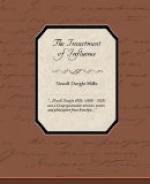Christopher Wren’s intellect wrought out the plan for St. Paul’s Cathedral. But all impotent to realize themselves, these plans, lying in the King’s council chamber grew yellow with age and thick with dust. One day a great heart stood forth before the people of London, pointing them to an unseen God, “from whom cometh every good and perfect gift,” and, plying men with the generosity of God, he asked gifts of gold and silver and houses and lands, that England might erect a temple worthy of him “whom the heaven of heavens could not contain.” The mind of a great architect had created a plan and a “blue-print,” but eager hearts inspiring earnest hands turned the plan into granite and hung in the air a dome of marble.
Thus all the great achievements for civilization are the achievements of heart. What we call the fine arts are only red-hot ingots of passion cooled off into visible shape. All high music is emotion gushing forth at those faucets named musical notes. As unseen vapors cool into those visible forms named snowflakes, so Gothic enthusiasms cooled off into cathedrals.
Our art critics speak of the eight great paintings of history. Each of these masterpieces does but represent a holy passion flung forth upon a canvas. The reformation also was not achieved by intellect nor scholarship. Erasmus represents pure mind. Yet his intellect was cold as winter sunshine that falls upon a snowdrift and dazzles the eyes with brightness, yet is impotent to unlock the streams, or bore a hole through the snowdrifts, or release the roots from the grip of ice and frost, or cover the land with waving harvests. Powerless as winter sunshine were Erasmus’ thoughts. But what the scholar could not do, Luther, the great heart, wrought easily.
Thus all the reforms represent passions and enthusiasms. That citadel called “The Divine Right of Kings” was not overthrown by colleges with books and pamphlets. It was the pulse-beats of the heart of the people that pounded down the Bastille. Ideas of the iniquity of slavery floated through our land for three centuries, yet the slave pen and auction block still cursed our land. At last an enthusiasm for man as man and a great passion for the poor stood behind these ideas of human brotherhood, and as powder stands behind the bullet, flinging forth its weapons, slavery perished before the onslaught of the heart.
The men whose duty it was to follow the line of battle and bury our dead soldiers tell us that in the dying hour the soldier’s hand unclasped his weapon and reached for the inner pocket to touch some faded letter; some little keepsake, some likeness of wife or mother. This pathetic fact tells us that soldiers have won their battles not by holding before the mind some abstract thought about the rights of man. The philosopher did, indeed, teach the theory, and the general marked out the line of attack or defense, but it was love of home and God and native land that




